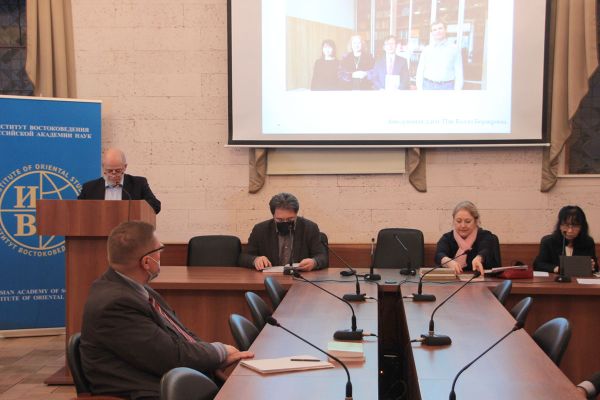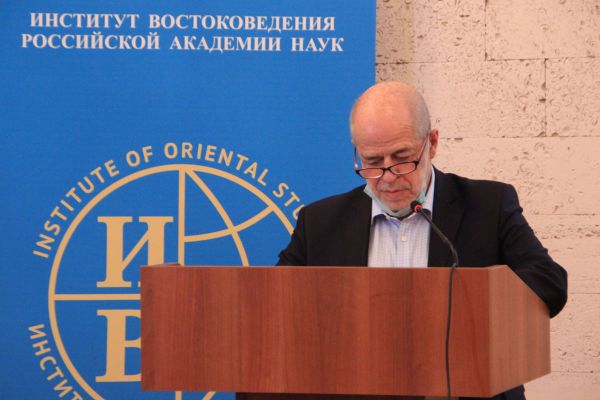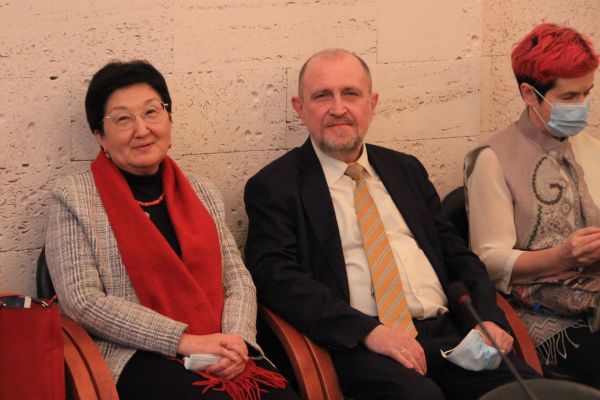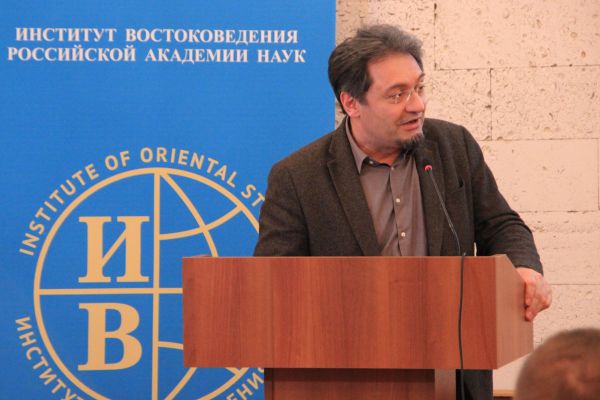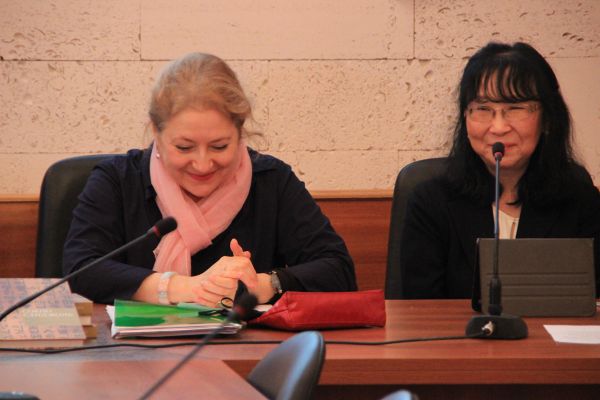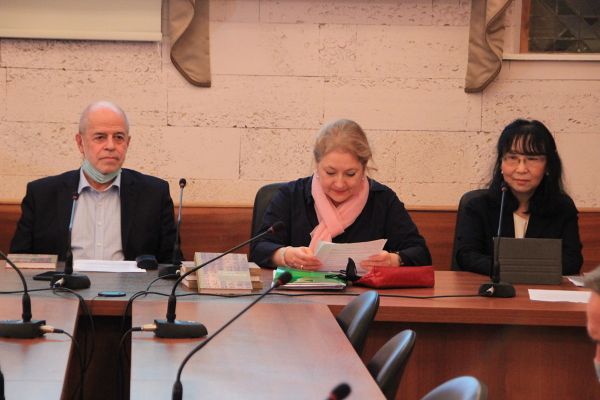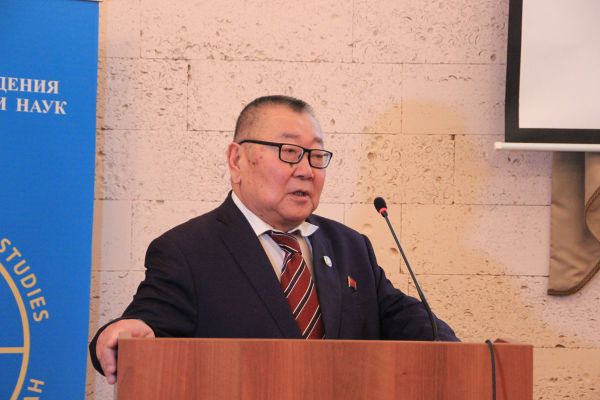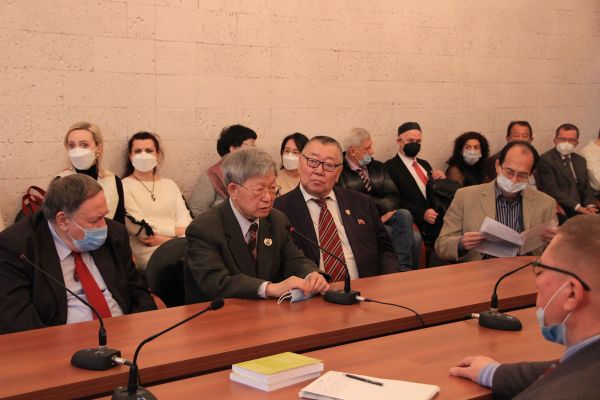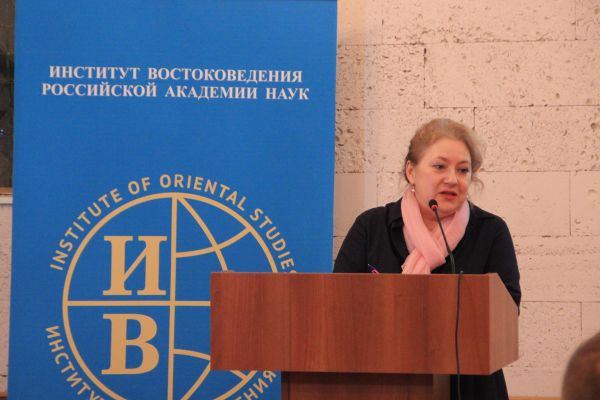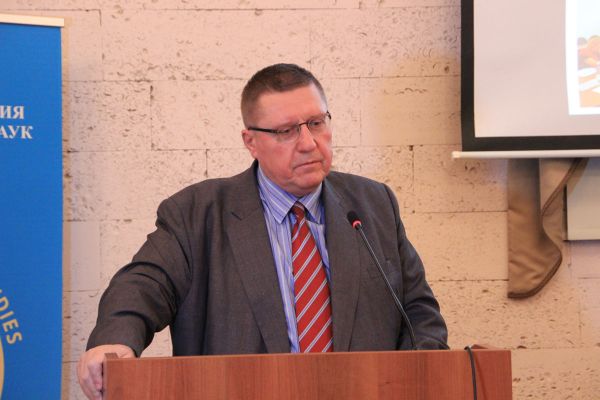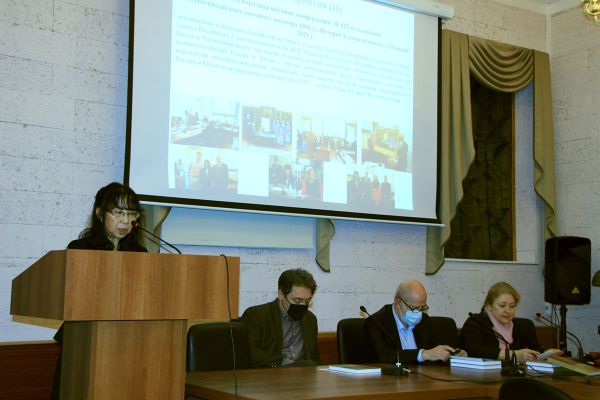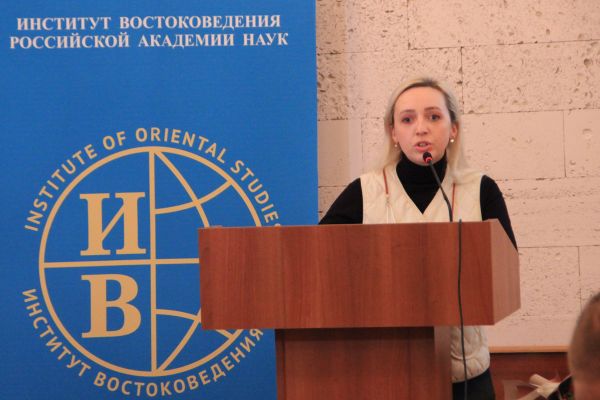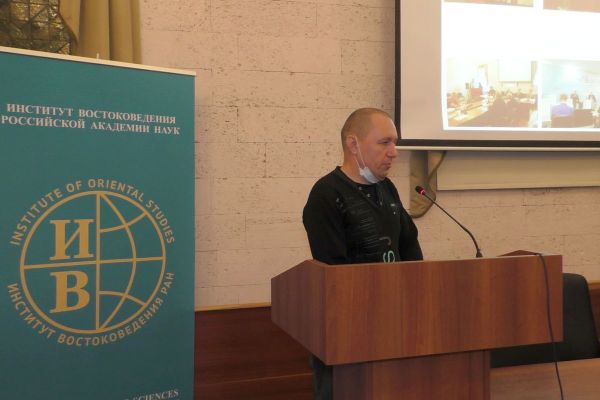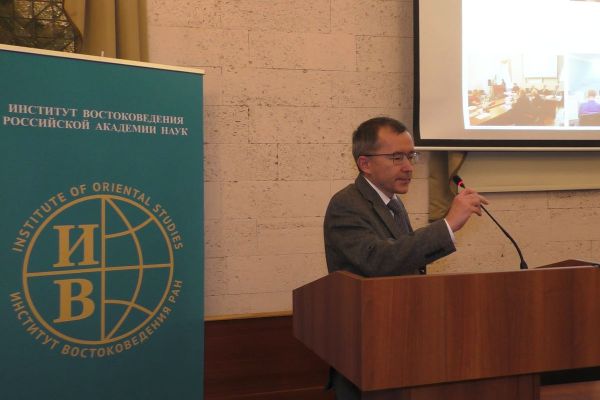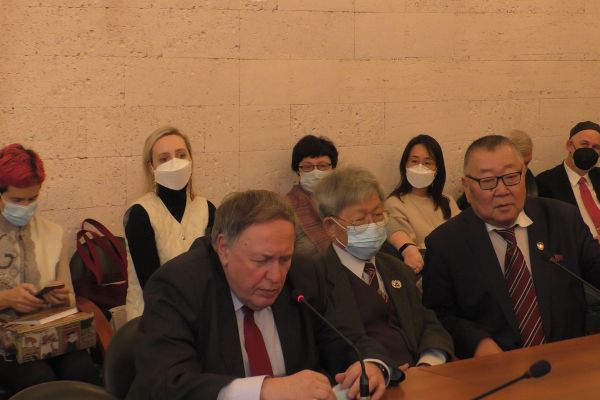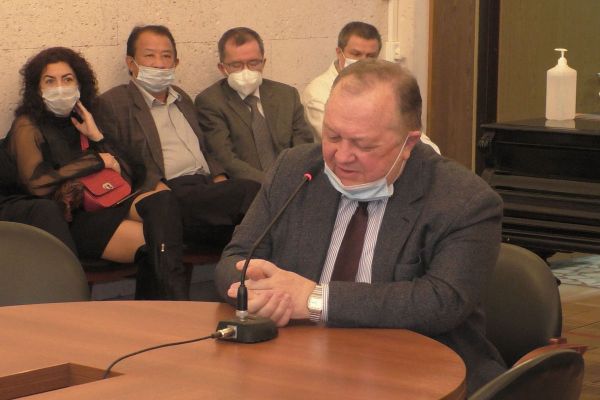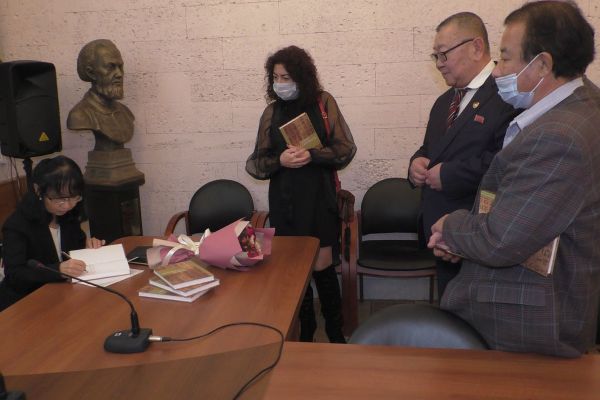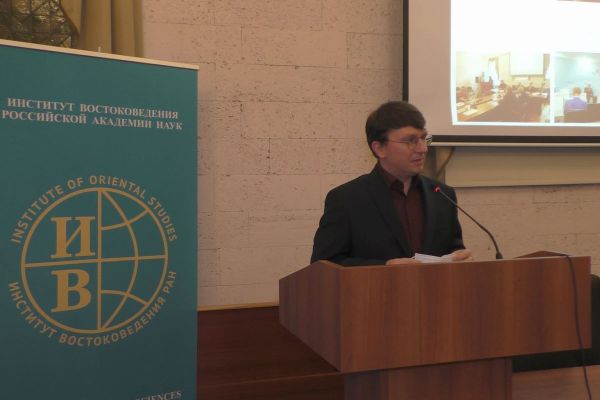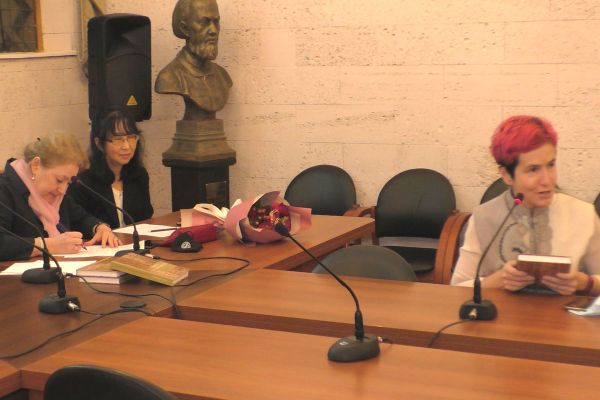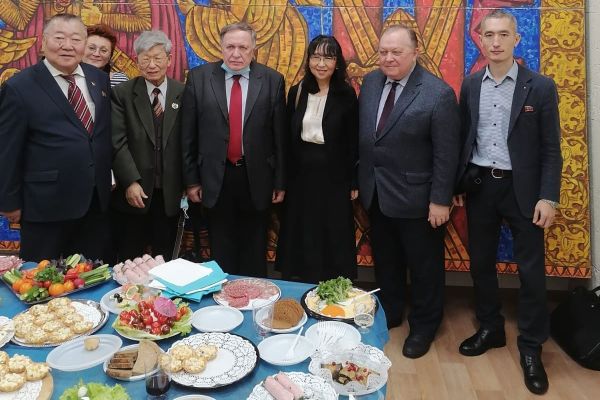News
Center News
9 ноября 2021 года
Presentation of the book “Seokbo sangjeol. Volume 3. Extracts from the biography of Shakyamuni” and a presentation by the Cabinet of Korean History and Culture and a collection of personal collections of works by leading Russian scholars of Korean studies
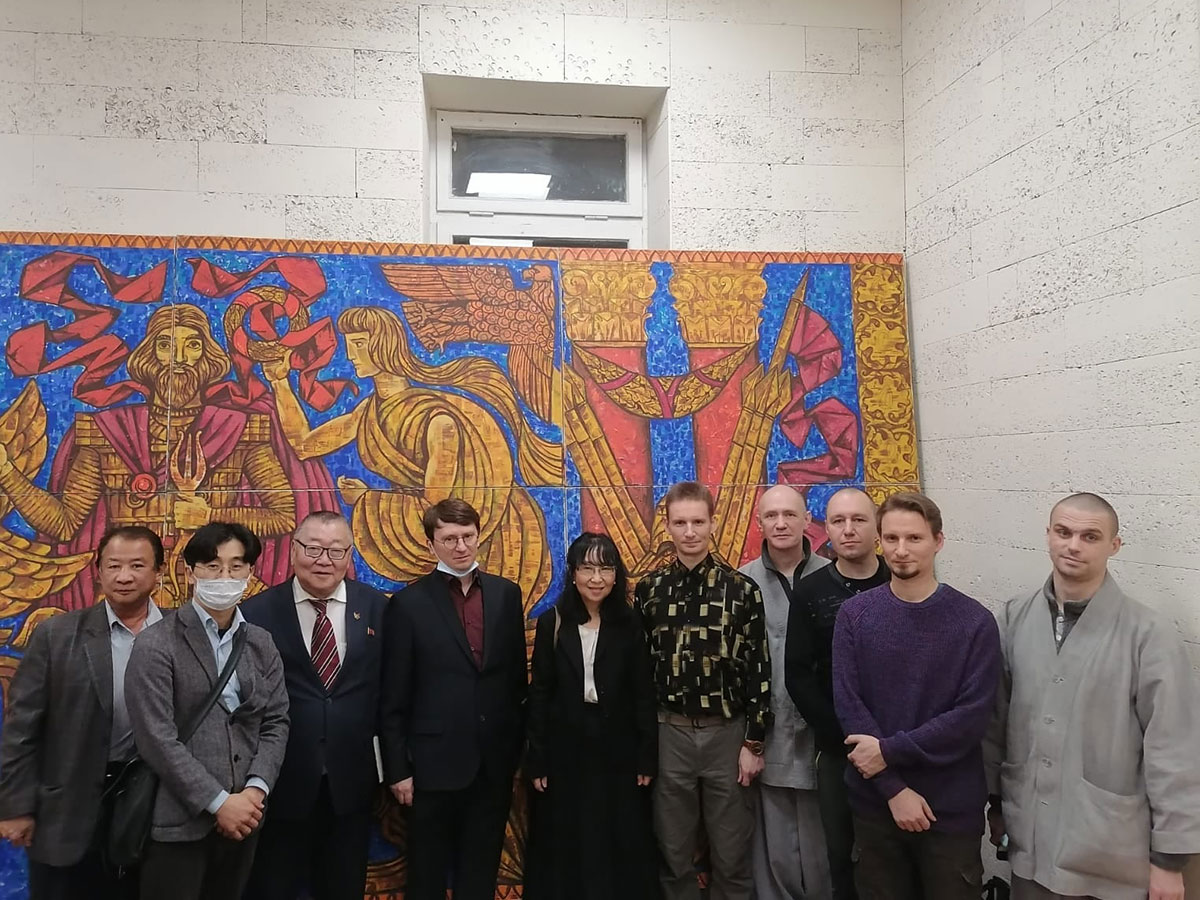
The event was held by the Cabinet (Laboratory) of Korean History and Culture with the support of the Academy of Korean Studies.
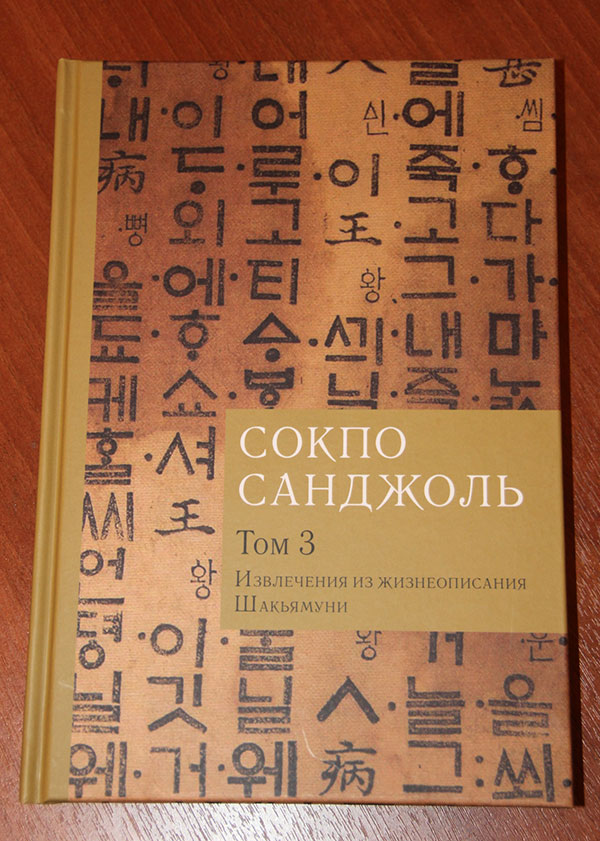 The Institute of Oriental Studies of the Russian Academy of Sciences hosted a presentation of the book “Seokbo sangjeol. Volume 3. Extracts from the life of Shakyamuni. / Scientific. ed. Valery P. Androsov, editor-in-chief Bella B. Pak, trans. with medium lang. Stanislav O. Belyansky. M.: IVRAN, 2020. 284 p./.
The Institute of Oriental Studies of the Russian Academy of Sciences hosted a presentation of the book “Seokbo sangjeol. Volume 3. Extracts from the life of Shakyamuni. / Scientific. ed. Valery P. Androsov, editor-in-chief Bella B. Pak, trans. with medium lang. Stanislav O. Belyansky. M.: IVRAN, 2020. 284 p./.
The presentation was attended by well-known Russian and foreign figures of science, religion, culture, diplomats, representatives of Russian oriental studies, the Korean Foundation.
Presentation participants:
IOS RAS
- Naumkin Vitaliy Vyacheslavovich — scientific director of the Institute of Oriental Studies of the Russian Academy of Sciences, Academician, Doctor of Historical Sciences, Professor
- Alikberov Alikber Kalabekovich - Director of the Institute of Oriental Studies of the Russian Academy of Sciences, Doctor of Historical Sciences
- Romanova Natalya Gennadievna - Deputy. director of IVRAN, candidate of historical sciences
- Golovachev Valentin Tsunlievich - Deputy. Director of IVRAN, Doctor of Historical Sciences
- Demchenko Alexander Vadimovich - Scientific Secretary of IVRAN, Candidate of Historical Sciences
- Pak Bella Borisovna - head. Department of History and Culture of Korea, Doctor of Historical Sciences, Leading Researcher at IVRAN
- Belyansky Stanislav Olegovich, employee of the Cabinet of History and Culture of Korea
- Alexandrova Natalya Vladimirovna, Candidate of Historical Sciences.
- Orlova Keemya Vladimirovna — Doctor of Historical Sciences, Leading Researcher at IVRAN
- Ermakov Kirill Vladimirovich - employee of the Cabinet of History and Culture of Korea
- Vorontsov Alexander Valentinovich - head. Department of Korea and Mongolia, candidate of historical sciences.
- Kuzmin Sergey Lvovich, Doctor of Historical Sciences, Leading Researcher, IVRAN
- Valeria Kolgina — assistant director of IVRAN
- Vanina Evgenia Yuryevna, Doctor of Historical Sciences, Leading Researcher, IVRAN, Head. Sector
- Kashin Valery Petrovich, candidate of historical sciences.
- Sin Sera, graduate student
Publishing house of Buddhist literature "Nartang"
- Andrey Anatolyevich Terentiev, editor-in-chief of the magazine "Buddhism of Russia", head of the publishing house "Nartang"
Embassy of South Korea
- O Ekaterina — Deputy Director of the Moscow branch of the Korean Foundation
IFES RAS
- Zhebin Alexander Zakharovich — Director of the Center for Korean Studies
- Kim Yong Un - Leading Research Fellow Center for Korean Studies
MGIMO
- Sukhinin Valery Evgenievich – Associate Professor of the Department of Japanese, Korean, Indonesian and Mongolian Languages
ISAA MSU
- Khazizova Ksenia, Associate Professor
- Kondratieva Elena, Candidate of Philological Sciences, Associate Professor
Korean Zen-Buddhism temple in Moscow "Dalmasa"
- Ilcho synim (Peter)
- Ilge synim
- Maxim Zhukov
- Chinghe synim
Korean Educational Center Wongwan
- Avdeev Mikhail Viktorovich, director of the Korean Educational Center Wongvan
- Jang Dong-jae, President of Wongwan Korean Educational Center (Light of the Circle)
Save Tibet Foundation
- Natalia Inozemtseva
SOCIETY OF DESCENDANTS OF FIGHTERS FOR THE INDEPENDENCE OF KOREA
- Shorukov Alexander Olegovich, President of the NGO "Descendants of the Fighters for the Independence of Korea"
- Men Andrey Donukovich
- Men Angela
- Tsoi Yuri Alekseevich, Professor, Corresponding Member of the Russian Academy of Sciences
- No no. Ph.D.
MROO "Bomminren"
Kim Felix Petrovich - Chairman
Korean War Veterans Council
Shin Andrey Petrovich — chairman of the Korean War Veterans Council
The moderator deputy Director of the Institute of Oriental Studies of the Russian Academy of Sciences Natalia Gennadievna Romanova.
In his address, the scientific director of the Institute of Oriental Studies of the Russian Academy of Sciences, Academician of the Russian Academy of Sciences Vitaly Vyacheslavovich Naumkin noted the importance of translating the outstanding monument of world literature, the Korean Buddhist canon "Seokbo sangjeol" into Russian, made thanks to the "selfless work of the scientific team of the Cabinet of History and Culture of Korea of the Institute of Oriental Studies of the Russian Academy of Sciences: translator, initiator of the publication and executive editor, author of the introductory article, comments by Bella B. Pak, co-author of the introductory article by the late Valery P. Androsov, and with support from the Korea Foundation. In his speech, he emphasized the special significance of the fact that it was the scientists of the Institute of Oriental Studies of the Russian Academy of Sciences who became the pioneers in the field of translating this outstanding monument of religion, history and art, the first translation of Buddhist sutras from Chinese into Korean, created the next year after the creation of the Korean national alphabet to spread the Buddhist teachings. Vitaly Vyacheslavovich also emphasized that this is the first prose work and the earliest monument of national writing, for which the newly invented world's first metallic type was used, which became a revolution in book printing.
In conclusion, he pointed out that the work is of undoubted interest both for historians and religious scholars of the institute, which is a unique complex center for the study of the East, but also for everyone who is engaged in the Far East, and congratulated everyone, to the work, being a description of the life of the Buddha, was published in 1446 as one of the first immediately after the formation of the Korean national alphabet and, as a result, is one of the most important monuments of the medieval Korean language and is of great literary value. According to him, among the many Asian monuments associated with Buddhism, this work best reflects the Buddhist canons of the Republic of Korea. The translation of such a very complex but extremely important cultural heritage of the Republic of Korea in Russia shows how important humanitarian research is for the Institute of Oriental Studies of the Russian Academy of Sciences and how great the patience of its employees is. In conclusion, Lim Cheol Woo expressed great joy that the Korea Foundation was able to support such a laborious translation project and expressed his gratitude to Bella B. Pak for completing the translation despite all the difficulties and the unfavorable situation with the spread of coronovirus infection. “I believe that through the translation of “Seokbo sangjeol”, the humanitarian relations and mutual understanding between our countries will become even deeper,” said Lim Cheol Woo.
In a welcome word Editor-in-Chief of the “Nartang” Publishing House Andrey Anatolievich Terentyev expressed his joy at the release of the Russian translation of the 3rd volume of Sokposanjol and congratulated the translator Stanislav O. Belyansky and Bella B. Pak as Managing Editor of this publication. According to A.A. Terentyev, “this book will help fill in an important gap in domestic studies of Buddhism: after all, incomparably less is known about the Korean branch of Buddhism in Russia than, say, about Japanese or Tibetan Buddhism - despite the fact that groups of followers and followers have appeared in Russia for many years Korean Buddhism. In conclusion, Andrei Anatolyevich expressed his hope that the work on the translation of Korean Buddhist monuments would continue and we would learn to better understand the spiritual culture of Korea.
In his welcome speech. Head of the Center for Korean Studies of the Institute of the Far East, Ph.D. Philosophical Sciences Kim Yong Un congratulated the leadership of the Institute and the editor-in-chief B.B. Pak with the publication of the Russian translation of the 3rd volume of "Seokbo sangjeol". In his opinion, "the release of this work is very important not only from the point of view of religious studies, and not only from the point of view of understanding the features of Korean Buddhism, but from the point of view of understanding the cultural world and its influence on the political and social processes that take place in both parts of Korea," since “To correctly understand what is happening in the two Koreas, one can understand the essence of Korean Buddhism more deeply ... The spiritual foundations of Buddhist culture and Buddhist philosophy had a huge impact on the way of thinking and politics of the leaders of both parts of Korea. Therefore, the publication of this work and further publication will help us to better understand both the current trends and the state of development of the Korean states, ... try to understand why, for example, the Communist Party regime in North Korea has been holding on for so long. The TPK will also rule their country for a very long time. And the basis of this is not only Confucianism, but also Buddhist psychology, Buddhist religion, Buddhist consciousness.” At the end of his speech, Kim Yong Un once again congratulated the staff of the institute and the hero of the day B.B. Pak with the release of a significant book and wished further great success.
The following speeches were also made at the event:
Responsible editor of the book - Pak Bella Borisovna, Doctor of Historical Sciences, Head of the Cabinet of Korean History and Culture of the Institute of Oriental Studies of the Russian Academy of Sciences;
spoke about the main directions and main results of the work of the Cabinet of Korean History and Culture, established in 2018 as an interdepartmental group to study current topics of Korean history and culture, and on November 11, 2020, officially established as a scientific division of the institute. B.B. Pak noted that the Cabinet conducts research on topical topics of Korean history and culture within the main areas: the cultural and spiritual heritage of Korea, centuries-old traditions and the modern development of historical, cultural, trade, economic, political and diplomatic relations between Russia and Korea, history and the current situation Korean diaspora in Russia. The most important direction of the Cabinet is the translation and commenting of written monuments, special attention is paid to the fundamental history. monuments.
Much attention is paid to the study of Russian-Korean relations, their distinctive features and traditions of the initial stage, the disclosure of new facets of the "Russian presence in Korea".
Work continues on the preparation of monographs within the Institute's series "Russian Koreans" about outstanding Russian Koreans.
The basis of the Cabinet is a unique collection of personal collections of Russian Korean scholars, and challenging task in working with it is to store, describe and digitize the works of leading Russian scientists on Korea, in support of the classical domestic oriental studies traditional for the Institute of Oriental Studies of the Russian Academy of Sciences as one of the oldest academic institutions in Russia. It includes unique collections of L.R. Kontsevich, Yu.V. Vanina, Myung Dong Wook, Kim Lechun , B.D. Pak.
Further in his speech, Bella B. Park spoke in more detail about the work of translating the outstanding monument of literature of the 15th century "Seokbo sangjeol" in the framework of an international perspective project jointly with Dongguk University, the first result of which was the publication of a commented translation into Russian of the 3rd volume, released in 2020. She dwelled on the characteristics and meaning of the translation of the 3rd volume “Seokbo sangjeol” into Russian and its editions for Korean studies. The creation of a Russian translation is an exceptionally important undertaking, since the presented Korean source should be regarded as a literary monument of paramount importance not only from the point of view of language, history and culture, but also through the possibilities of Buddhist studies to identify the features of Buddhist interpretations of the initial Joseon period. The publication of this edition will play an important role both in familiarizing the general public with the outstanding monument of Korean literature and in stimulating the interest of Orientalists in Korean Buddhism, and will complement the traditional orientation of Buddhist works on Indological and Tibetological topics with the development of research in the field of Korean Buddhism.
The release of the 3rd volume of "Seokbo sangjeol", being an important milestone in the development of domestic and foreign Korean studies and an unconditional breakthrough in research, was the first step towards a complete scientific translation of "Seokbo sangjeol" into Russian and later into English.
The further implementation of this project is obviously one of the most important tasks of domestic Korean studies. In 2021, the project of the Cabinet for the translation into English of the next 4 volumes was elected by the Academy of Korean Studies of the Republic of Korea.
In conclusion, Bella B. Pak expressed her gratitude to the leadership of the Academy of Buddhist Studies of Dongguk University, who provided great assistance in the implementation of this publication, providing the opportunity for the translation into Russian and publication of the 3rd volume of "Seokbo sangjeol" and colleagues who read the text of the translation in the manuscript and made many valuable corrections to it, for consultations, contributed to the improvement of the text of the book. Special thanks to B.B. Pak expressed her gratitude to the leadership and staff of the Korea Foundation for the financial support of the publication.
The translator, employee of the Cabinet of History and Culture of Korea Stanislav Olegovich Belyansky spoke about the work on the translation of the 3rd volume of "Seokbo sangjeol", indicating that the basis for the translation was the text of the edition of Dongguk University, comments and interpretation of terms. He stated that in his work on the translation of the monument, he based himself on the modern Korean text, excerpts from "Shijiapu" and "Shijiashipu" in Wenyan and on the text in medieval Korean.
Head of the Department of Korea and Mongolia, Candidate of Historical Sciences Alexander V. Vorontsov, in his speech, joined the congratulations to the hero of the day and the presentation of the Cabinet. Alexander Valentinovich called "Seokbo sangjeol" the most important publication in Korean studies and Buddhist literature. “It is gratifying that such a renaissance of in-depth interest in historical fundamental medieval research is taking place at our institute. We remember that especially Yu.V. Vanin, at the beginning of his scientific career, entered Korean studies and, first of all, as a specialist in the Kore era. He wrote several monographs that are still textbooks and will be so, ”said A.V. Vorontsov.
A.V. Vorontsov stressed that the work on the monument required the highest qualifications, historical and linguistic, in particular, given the different sound and content of Korean readings of Chinese characters in different eras. He emphasized the importance of such a global project and that it will continue, since “saturation of the Academy of Sciences and scientific institutions with such serious powerful fundamental research is extremely valuable and it is an adornment both for the institute and Korean studies, and for all our Korean studies.”
Chairman of the International Union of Public Organizations of Koreans for Promoting the Peaceful Unification of Korea "Bomminryong" Kim Felix Petrovich called the translation of "an ancient work into Russian" a milestone event. He reminded the audience that “Seokbo sangjeol” is one of the first printed books in the world, since metal type was first created in Korea, and Europe did not appear until a century and a half later. F.P. Kim called the release of the book a very joyful event for the entire Korean diaspora in Russia and congratulated the authors and the entire staff of the institute on such a wonderful event.
Director of the Center for Korean Studies of the Institute of the Far East of the Russian Academy of Sciences Alexander Zakharovich Zhebin congratulated Bella B. Pak with success. He noted the importance of work on the development of the historical past, presenting it to the general public, when they try to distort history, rewrite, in this light, the significance of B.B. Pak on the history of Russia and the history of Korea in order to have the right ideas and understanding of the history of our relations. Secondly, Alexander Zakharovich emphasized the importance of the existence of such a scientific dynasty in
Korean studies. “We all remember the outstanding contribution of your father to the study of the history of Russia and relations between Russia and Korea, and it is very good that it so happened that you were able to continue his work and study and acquaint scientists and the public with the history of Russian- Korean relations, with the history of the history of Russia and Korea in general,” A.Z. Zhebin said.
Shorukov Alexander Olegovich, President of the Regional Public organization "Descendants of the fighters for the independence of Korea", in his speech congratulated the authors of the work and noted the great role of this kind of activity of academic institutions and individual scientists in preserving the memory of outstanding figures - fighters for the independence of Korea, research in the field of history and culture of Korea . He noted that such publications are extremely important for the modern generation, which is quite far from historical roots and does not have information about their ancestors. Alexander Olegovich stated that this kind of work is extremely important for everyone who comprehended history through the works of such outstanding scientists as Bella Borisovna Pak and her father Boris Dmitrievich Pak, pointing out that he himself studied history through the works of B.D. Pack and B.B. Pack.
In conclusion, he thanked for the hard work and the release of the 3rd volume of Seokbo sangjeol and wished him continued success in his work.
Ilcho synim (Peter), the head of the Moscow Temple of Korean Zen Buddhism "Dalmasa" in his welcoming speech thanked for this work. book editor Bella B. Pak and all project participants. He clarified that in Korea, many texts were written by Korean monks in the Middle Ages, some of which became very famous throughout the Buddhist world in the Far East, i.e. in China, Japan, Korea, Vietnam, in particular, these are Voriosynim’s comments “Kesiki sillen” (“ Awakening Faith in the Mahayana"), which became the de facto standard on which many subsequent commentators relied and which are still studied in Buddhist seminaries in South Korea, Japan and China. He also mentioned "Chonte sakei", a text that became an encyclopedia of the teachings of Chonte. At the same time, Ilchosynim emphasized that despite the fact that the text “Seokbo sangjeol”, which was translated by the staff of the Institute of Oriental Studies of the Russian Academy of Sciences, is not so well known, not so popular, nevertheless its importance is enormous, especially for those who study Buddhism from a scientific point of view, from a practical point of view. Ilchosynim highly appreciated the work on the translation and expressed the hope that the work on the translation of Buddhist texts would not stop there, and would continue in the future. In conclusion, he once again congratulated on the release of the book and thanked all the participants in the project.
Avdeev Mikhail Viktorovich, Director of the Korean Educational Center "WonGwan" (Light of the Circle), in his welcoming speech, said that the center has taken part in the Sejong project since 2011 and bears the name of this wonderful ruler of Korea, who created the unique Hangul script, before the appearance of which Korea used the Chinese script. He pointed out the connection, in many respects, with the fate of Korea, the Korean people, the preservation of statehood, original culture, namely with the Hangul script, and paid special attention to the activities of the Sejong ruler in creating literary monuments in the newly created script. Mikhail Viktorovich emphasized the importance of publishing the Russian translation of “Seokbo sangjeol” in terms of opening this most important literary monument to the general reader in Russia, "which all Korea is proud of, which is a unique relic that preserves the sound of the language of Korea 500 years ago." According to M.V. Avdeeva, “such feelings are mutual. As soon as Russia pays attention to this most precious monument of Korean culture, to the same extent they will open their eyes on the Korean Peninsula to those important moments that we cherish in Russia.” In conclusion, M.V. Avdeev congratulated everyone on this important event and thanked them for their hard work.
Sukhinin Valery Evgenievich - Associate Professor of the Department of Japanese, Korean, Indonesian and Mongolian languages, in his address noted the great importance of the monument of medieval writing, including for studying the history of the language. In his speech, he emphasized that in Korea in North and South, based on such monuments , study the history of the language, how phonetics and grammar developed, and therefore pointed out the need to use this monument, to the extent possible, to expand the horizons of MGIMO students so that they can get acquainted with the approximation to the original, with the state of the language as it was at 15 -16 centuries. Valery Evgenievich expressed admiration for the work of both the translator and the editor in view of the complex set of questions: “what to take as a starting point, the Chinese original or layout and translation into Korean, like the Koreans themselves at Dongguk University, and this is a Buddhist university, how they interpret certain things” .
Natalya Inozemtseva, Deputy President of the “Save Tibet” Foundation, congratulated in her address on the “outstanding publication”, in which so much work was invested from the first moment to the publication of the book. N. Inozemtseva reported in this regard that the Foundation is engaged in the preservation of the cultural and philosophical traditions of Tibetan Buddhism and has long-standing friendship and cooperation with the Institute. She recalled that Buddhism is one of the religions spread on the territory of the Russian Federation, including, the Tibetan form of Buddhism is practiced in three primordially Buddhist republics, and that the foundation is engaged, among other things, in maintaining translations of fundamental Buddhist works into Russian. For this purpose, the foundation, together with the Institute of Oriental Studies, organized a conference of translators of Buddhist texts, very symbolically in connection with the current presentation called "Toward the Russian-language Buddhist canon." N. Inozemtseva, on behalf of the Foundation and on behalf of the Organizing Committee, invited Bella B. Pak, employees of the Cabinet of Korea, and a translator will join the conference in 2022, where translators will discuss, among other things, methodological problems of translation: terminology, source study, approaches to translations, which, in principle, regardless of the language, have some common, where translators can share their experience. According to N. Inozemtseva, the participation of specialists in the translation of Buddhist literature from the Korean language will undoubtedly enrich the joint experience.
Keemya Vladimirovna Orlova, Doctor of Historical Sciences, reviewer, editor and participant of the project, noted the brilliant translation, excellent language, excellent comments involving not only Chinese, Korean, but also Mongolian and Tibetan sources, and therefore turned out to be very informative. In conclusion, he congratulated everyone on the publication of the book.
The meeting was held in a friendly atmosphere. The participants of the event expressed hope for the development of such initiatives, which contribute to the deepening of relations and mutual cooperation between Russia and Korea.
The presentation participants continued informal communication during the buffet.

